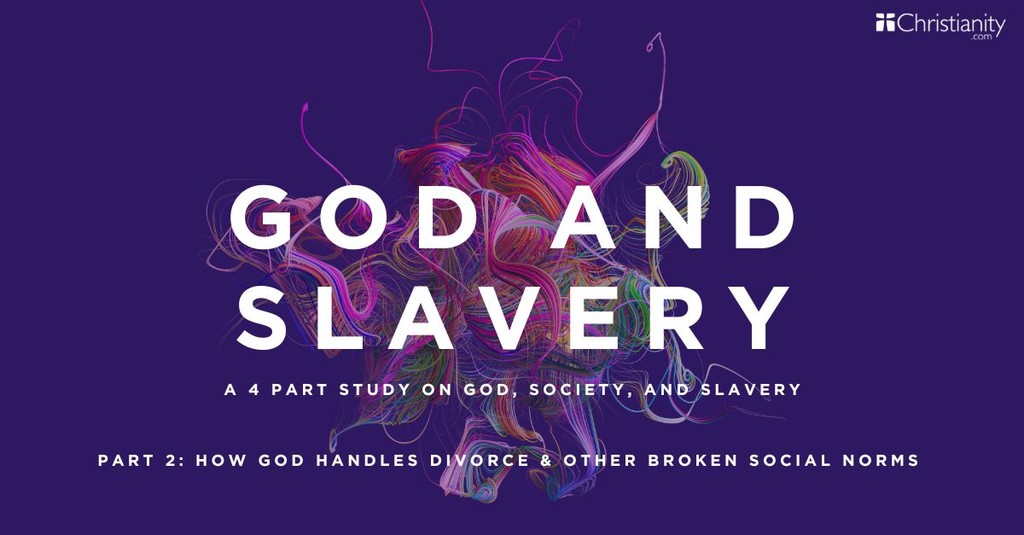
Those who suggest that God endorses slavery generally point to legal texts in Exodus, Leviticus, and Deuteronomy. Such texts are relevant to the conversation, but they don’t tell the full story. While the terms translated “slavery,” “slave,” or “slaves” will be addressed in Part 3, it is important to note that there are narratives in the Hebrew Bible that reference “servants” (the same word translated as “slaves” elsewhere) bearing little to no resemblance to antebellum or modern-day slavery. Prior to addressing the translation issues, however, it seems beneficial to consider (1) how God approaches other social arrangements, namely divorce, and kingship, and (2) whether and how God’s approach to other social arrangements might inform our understanding of slavery in the Hebrew Bible.
Photo Credit: SWN Design
What Does the Bible Say about Divorce?
In Matthew 19, the Pharisees challenge Jesus on the issue of divorce, asking,
“Is it lawful to divorce one’s wife for any cause?” - Mattew 19:3
In response, Jesus references creation, noting that when a man and woman come together, they become one flesh (19:6). God has joined the man and woman together, and no one should separate them (19:6).
"Since they are no longer two but one, let no one split apart what God has joined together." - Matthew 19:6
This initial line of argument points back to God’s ideal portrayed in Genesis 2. Prior to the fall, God united male and female with no provision for divorce. The original social arrangement of marriage was intended to be a lifelong institution with no provision made for divorce. The union, as “one flesh” suggests, was to be permanent.
However, as the Pharisees point out, Deuteronomy 24 contains guidance regarding divorce (Matt 19:7). Jesus now explains that the law was not an endorsement of divorce but an accommodation. Because the people’s hearts were hard, divorce was allowed, “but from the beginning, it was not so” (Matt 19:8). Despite the provision of divorce due to the hardness of the people’s hearts, Jesus notes that the bonds of “one flesh” linger even after divorce and preclude remarriage except under certain circumstances (19:9).
“'Then why did Moses say in the law that a man could give his wife a written notice of divorce and send her away?' they asked. Jesus replied, 'Moses permitted divorce only as a concession to your hard hearts, but it was not what God had originally intended. And I tell you this, whoever divorces his wife and marries someone else commits adultery—unless his wife has been unfaithful.'” - Matthew 19:7-9
Does the way God handles divorce offer a paradigm through which we might understand the way he handles other social arrangements brought about by the fall and the hardness of human hearts? It is certainly possible. What we can say for sure is that, in the case of divorce, God allows and sets limits on a practice that is not in keeping with the “one flesh” union established “from the beginning,” and he does so because of the hard-heartedness of humanity. To put it more generally, we may say that God does not rigidly demand adherence to an ideal but accounts for human fallenness in what he allows and how he allows it.
What Was the Purpose of Kingship?
The establishment of the Davidic covenant (2 Sam 7:1-17) makes it easy to think of kingship as something God established for the good of Israel. After all, the messiah was to come from the house and line of David. Yet, we find that the institution of kingship in Israel, as portrayed in 1 Samuel 8, had different theological implications.
Prior to the institution of kingship, God raised up judges to rescue Israel from their enemies. While often viewed as the last judge of Israel, Samuel’s role is somewhat ambiguous or, at least, multifaceted. He is, however, pictured as “judging” Israel (1 Sam 7:6) after the death of Eli, who is described as having “judged Israel forty years” (4:18). These judges were to function under the ultimate authority of God, who weighs all the actions of humankind (2:3), determines human destinies (2:4-8), and will ultimately “judge the ends of the earth” (2:10). The Lord’s judgment was to be enacted through the efforts of earthly judges. When it wasn’t, the Lord took action.
In chapter eight, however, the people are faced with yet another transition. Samuel is getting old and decides to appoint his sons Joel and Abijah as judges over Israel. The trouble is that Joel and Abijah “did not walk in his ways but turned aside after gain” (8:3). Samuel’s sons were not going to judge well. There is even some question as to whether Samuel should have chosen his successors. As Robert Alter notes, “he [Samuel] oversteps his mandate as judge…by attempting to inaugurate a kind of dynastic arrangement.” In any case, it becomes clear quite quickly that Samuel’s sons are not going to carry on the faithful judgments of Samuel.
In response, the elders of Israel request that Samuel appoint a king to rule over Israel “like all the nations” (8:5). When Samuel seeks guidance from God about what to do about the request, God tells Samuel to “obey the voice of the people” (8:7). Even so, it seems clear that the request for a king points toward a fissure between God and Israel. As God notes, the people are not rejecting Samuel, “but they have rejected me from being king over them” (8:7). The people’s unwillingness to trust God’s provision and protection, despite the failings of certain earthly leaders, prompts them to seek a new leader and to conform to the ways of the nations (8:8).
It is worth noting that kingship was contemplated prior to its institution. Deuteronomy 17:14-20, for instance, includes a set of instructions to regulate the Israelite king. The king, in other words, remained under the authority of God. Still, in this instance, the institution of kingship seems to be driven by dissatisfaction with the current social arrangement God had established. God’s ways are deemed inadequate in comparison to the practices of the nations surrounding Israel.
So, if the people reject God, why does God tell Samuel to grant the Israelites' request for a king? Kingship may well have been “part of the plan” at some point; however, in this instance, it seems clear that God is allowing Israel (with appropriate warning; cf. 8:10-18) to pursue a social arrangement that reinforces a flawed theology (e.g., the request for a king is a rejection of God as king). As Peter Leithart suggests, “When the elders of Israel said they wanted to be like the nations, they were saying that they were tired of being Israel. Thus, the final result of this request would be that Israel, instead of ‘serving Yahweh’ (see 7:4), would become slaves to the king (8:17).”
The text does not give us a clear answer as to why the Lord grants Israel’s request. Based on Deuteronomy 17, it would seem that kingship was not morally abhorrent. It seems likely that God had kingship in mind for Israel at some point; however, the fact remains that God agreed to allow Israel to reject him as king. That does not mean he is no longer king, but he is willing to allow Israel to make their own choice even when that choice involves rejecting him.
3 Things What Can We Learn from What the Bible Says about Divorce and Kingship
These two narratives provide new frameworks that might inform our understanding of God’s relationship to social arrangements. In the case of divorce, God makes provision for a practice due to human sin, and such provisions come with guidelines for the practice.
In the case of kingship, we see that God will allow his people to make their own choices even when those choices involve a rejection of him. While the institution of the Israelite monarchy does not appear to be morally problematic, it does have theological implications. God does not seek to correct the people’s theological errors at the moment. Instead, he gives them what they want and allows them to experience the difficulties of kingship firsthand.
What Can We Learn from What the Bible Says about Divorce and Kingship?
1. God makes provision for our shortcomings.
Once the right relationship between God, humanity, and the rest of creation is broken at the fall, God bears with humanity’s disobedience and frailty. While there are numerous times in which God’s justice seems to be “slow” or absent (Ps 13; 94; Rev 6:10), no inappropriate behavior escapes God's judgement.

2. God is willing to allow humanity to reject him.
Such rejection is detrimental in any number of ways. God does not force humanity to be loyal to him. It would seem that there are instances when God allows deep theological errors, though not without limits or restrictions.
3. The reasons for God’s choices are not necessarily straightforward or uniform.
While it has become fashionable to question God because he allows or (supposedly) endorses slavery, these narratives should give us pause in assuming we know God’s mind. God may well be working within the social arrangements of the day as an accommodation of human limitation in a fallen world (as with divorce). He may be allowing people to reject him and go their own way (as with the institution of kingship).
We may be uncomfortable with God’s seeming inaction with regard to injustice and human suffering, as was seen in the slavery of the Antebellum South, but God’s justice won’t be absent. God will deal with the world’s disorder. For now, our role is to be faithful to the Lord and persistent in confronting evil. Participating in falsehood, compromising our convictions, or tolerating foolishness and abuse will breed complacency. A complacent church is a church that has forgotten what it means to be the image of God.
Click to read Part 1: Why Understanding Slavery in the Bible Matters Today
Click to read Part 3: What Sets Modern Human Trafficking Apart from Ancient Slavery?

Originally published Friday, 14 June 2024.
